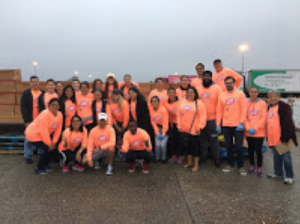So, you’ve decided to (or are thinking about deciding to) enter the most hands-on, high-paced, stressful field you can choose. WELCOME! There are not many people with both the intelligence and the personality to be a health care provider, so I applaud you for recognizing that you are both of those things. I also admire the fact that we all have a desire to selflessly give our time and efforts to help those who need it most. There is no other field that provides this sense of satisfaction and I hope that you enjoy it as much as I do.
Now, you took step one in figuring out what field you would like to be in, but what comes next? Whether you are a high school student, a first year student (freshman- or ever sophomore!), or an upperclassman, I wrote this post to give you some ideas. Regardless of the exact profession you wish to enter, everything I mention below will be pre-health profession related and will help you to become the best medical provider you can be! While you certainly do not need to accomplish all ten things on this list, I will tell you from experience that most people who get into a graduate school in the field of medicine accomplish a majority of these things before applying. While the requirements and recommendations vary between different programs, such as pre-nursing, pre-med, and pre-PA, nothing on this list would hurt your chances of applying. Let’s get started.
- Become A Tutor– If you are as type-A as I am and you managed to get above an A- in your science courses, walk yourself down to the tutoring center in Greenley Hall or to the EOP center in Laffin Hall and inquire about open tutoring positions. You could also inquire at a local tutoring center or even post flyers for private tutoring around campus with the permission of administration. I have been a tutor my entire college career and it is the absolute best way to retain the information you learned in class and also to learn something your particular professor may not have covered! As a bonus, for those of us taking the MCAT, tutoring students in subjects that are on the test will make studying for the exam much easier. For those of you that are unfamiliar with the MCAT, it is the Medical College Admissions Test that tests your knowledge of biology, chemistry, physics, and sociology/psychology, all of which you should have learned while in college. I don’t know too many people that can handle MCAT level biology after two years have passed since having taken a biology course, so by tutoring biology you can eliminate the time needed to study for the MCAT later on! For convenience, I attached some links below to give you some more information on the tutoring center and EOP. The tutoring center does require a letter of recommendation from a professor you have taken that course with as well as a minimum of an A- in that course, so be prepared to provide those two things if you submit an application!
- Join A Club– I may be biased (actually, I am very biased) but the Pre-Health Professions Club is a must for anyone looking to enter the health care field. This club offers a number of opportunities, such as CPR training, chats with alumni who are now in graduate school, open panel discussions with admissions committees from various graduate programs, tours of nearby graduate schools, and even suturing lessons from a surgeon! I attached a picture of some of our club members who participated in a 5K for Breast Cancer together last October. Each year we mix up what we do and are always taking recommendations. So if you have the desire to be a veterinarian one day, tell us! We can bring in a current veterinarian to talk about the application process and where they went to school. We can even have Farmingdale almuni who are currently in veterinary school come in to talk to us. Whatever your needs are, I highly suggest joining this organization. Bonus: we have a wonderful group chat where students can form study groups, ask for advice on which classes to take, and even find new volunteer and club opportunities they may not have known about. For more information, contact our faculty advisor, who also happens to be the wonderful pre-health advisor, professor Amanda Lavery. Also, visit our page on OrgSync!
- Amanda Lavery Contact
- Farmingdale Pre Health Professions Club
*You may need a student ID to access this link!
- Volunteer, volunteer, volunteer– One thing that struck me as unusual is that on the AMCAS medical school application there is a section where you are able to list non-medical volunteer hours. With all of the pre-medical things we do, it’s hard to remember that they are looking for well roundedindividuals in multiple areas of life. Oy! It is also important to remember that schools like when they see a long-term commitment, so it’s better to get involved in an organization for a long time rather than having a few one-off experiences. Personally, I am a volunteer at the Mineola Volutneer Ambulance Corporation, meaning I ride around in an ambulance helping to transport sick or injured people to local hospitals. I also have a background in the golf industry, so I volunteer as a Marshal at local PGA events that come to the area. While I have some more ideas in the works, I am waiting for my schedule to clear up. The last thing you ever want to do is overbook your schedule, as you will be asking most of these organizations for letters of recommendation and they probably won’t want to recommend you if your punctuality or attendance is spotty! So my recommendation would be finding at least one medical and one non-medical way to give back to the community. In the past, I have volunteered at Stony Brook Veteran’s Home, the most welcoming and wonderful experience I have ever had! I also highly recommend a a local ambulance corporation. They are always looking for members and never hesitate to write you a wonderful letter if you put in the effort while you are there. I have attached a few helpful links below to get you started!
- Mineola Volunteer Ambulance Corps
- Farmingdale Volunteer Fire Department
- Long Island State Veterans Home
- Volunteer Opportunities for Long Island
- Start A Club or Become An Officer– One thing many people don’t realize is that starting a club looks spectacular on an application. If you have an idea, and can find at least ten people who can sign a sheet stating they would be interested in joining, you can start a club here at Farmingdale! If you simply don’t have an idea for a club, don’t fret! Another wonderful option is to become a club officer. Elections are typically held at the end of the spring semester and there are usually open positions due to seniors graduating. The typical officer positions include President, Vice President, Treasurer and Secretary. Sometimes there will be other positions such as Event Coordinator and Social Media Coordinator. Officers and founders of clubs gain some invaluable experience that is hard to find elsewhere. Once again, don’t try to take on too much responsibility! Farmingdale offers an Activity Hour on Tuesdays and Thursdays, which is a free time to designate for club meetings (otherwise, we’d all be in classes and never meet!). Unfortunatley, most clubs have conflicting meeting dates, making joining more than 2 rather difficult. As an officer, you are expected to be at most club meetings, meaning it would be difficult to be the president of more than one organization. Consider this when you think about running for a position. For more information on the requirements and who to contact, I attached a link below. For officer information, speak to someone in the club you are interested for about when they hold elections and what positions will become available.
- Shadow Different Professionals– I recommend shadowing multiple careers and specialties for anyone who is even considering a career in the medical field. At the start of my post-bac career, I thought I wanted to be a physical therapist. After about ten hours of shadowing one, I knew that field was definitely not for me! As I shadowed and talked to an increasing number of people in the medical field, I was able to narrow down exactly what I was truly interested in. By the end of this process, I can tell you for certain that I have a list of careers and specialties I would enjoy and those that didn’t interest me as much. Try not to pick anything that you are dead set on, but also don’t go into it with absolutely no idea! I listed below some typical specialties for those who are pre-med, pre-nursing or pre-PA to consider:

- Cardiology (heart)
- Neurology (brain)
- Trauma (disaster situations)
- Plastic Surgery (cosmetic- with exceptions such as burns and cleft palates)
- Ortho (bone)
- General Surgery
- Family Practitioner
- OB/GYN (babies and women’s health)
- Podcasts– The wonderful world of commuting to school or walking to class opens us up to the possibility of podcasts and audiobooks. You can even listen while on a run like I do! I never get in my car without turning on either a podcast, an audiobook or a taped class lecture (ONLY when a professor gives me permission to tape!). There are some wonderful podcasts to listen to as a pre-med student. I also make sure to ask every person who I admire to recommend a book to me. I keep a running list on an app called EverNote and I check one off each time I read a new one. I’ll list below some great podcasts as well as books for those in a similar position as myself
- Undifferentiated Medical Student
- The Pre Med Years
- Dear Pre Med
- EverNote Note Taking App
- 10 Books For Pre Med Students
- Even More Books For Pre Med Students
- Research– This is a tougher one than the others, as these programs are often highly competitive and usually won’t accept you until your junior year of college. When I was in my first undergraduate program, I was very close with one of my professors. We had the exact same academic interests and this person invited me to help them conduct an experiement that was later published in the Australian Journal of Medicine. After graduating, this experience landed me an internship at the Feinstein Institute for Medical Research on the Manhasset campus of LIJ. Schools ADORE undergraduate research and I highly encourage you to approach any professor on campus and ask if they need help with their research (if they are currently conducting research). My experience there landed me an A in one of the hardest research classes I was required to take because, well, I had seen it all before! Everyone else was rushing and struggling to learn new techniques while I was pipetting and p-valuing my way to success. You can also contact outside institutions like I did to seek out an internship. I included the link to LIJ’s research program, a link to my own research news article to give you an idea, as well as a few others that I quickly looked up for you (yes, for YOU!)
- LIJ Summer Research Internship
- Farmingdale Research Opportunities
- com Research Opportunities Search
- My Undergraduate Research
- Honor Societies– This is a tough one, guys. This requires you to get good grades in almost every single one of your classes. I think the reason why honor societies are so hard for people is because they either a.) don’t know what they want to be as a freshman and have no drive when it comes to taking general freshman electives they feel forced into taking or b.) they know exactly what they want to do and it’s DEFINITELY not anything related to the classes they are forced to take. I was a Neuroscience geek in college and I had to take History, Accounting, Public Speaking and Acting my first year. Let’s just say it wasn’t my most stellar work. So, I try to caution everyone to excel early in these general electives so you will gain entry to some of the more prestigious honor societies. Once you’re in most of them, they cannot necessarily “kick you out.” You are a member for life because you earned it! So if you do very well early on and a few of your upper level classes proved more challenging for you, don’t sweat it! Your freshman year 4.0 GPA will earn you a lifetime honor society membership. Some DO require that you maintain a certain GPA, but let’s be real, you should need no incentive to keep your GPA up anyway. To be a competitive candidate for any graduate program, you’ll want over a 3.2 as a minimum, so an honor society should not be your sole motivator to achieve a high GPA. These honor societies provide a number of benefits, such as a great resume builder, opportunities for scholarships, leadership role opportunities and great post-college networking. Although networking isn’t probably your highest priority right now since your career job is years away, you’ll thank me later! Here is a link to a page that contains all the information you could ever want (or need):

- Extracurricular Activities For Your Health!– In this crazy academic process you might find yourself getting slightly out of shape. I know before I entered this program I was a gym rat with about 7% body fat- and that all changed my first semester. I lost most of my muscle but the lack of sleep and overabundance of coffee kept the weight off, leaving me with a gaunt and pale appearance. While I looked skinny, I definitely didn’t feel healthy. It wasn’t until my fiancéshowed me his resume that I considered running as a healthy extracurricular activity to add to my growing resume. My other half is an avid runner who has participated in (and completed) multiple half marathons and full marathons. His whole life he was someone who gained weight easily, so he decided to make a drastic change and beat his metabolism into submission by running 20 plus miles a week for about four years now. While this is not at all related to medicine (or finance, the field he works in), it looks just superb on his resume. His lengthy finance resume includes words and tasks that I still do not fully understand, but the cherry on the cake is definitely his “how I spend my free time” section. Most people nap or eat in their free time, so you could imagine how appealing he looks to a potential employer after they read about all the running he does in the two to three free hours per day he has. Now I’m not saying you need to sign up for a marathon, or even run for that matter! Find a club or intramural team that plays a sport you enjoy, maybe get involved in yoga, or join a local bowling league. By doing so, you’ll be giving your body some love and making yourself an even more appealing candidate to schools. Farmingdale also has a wonderful weight room that is offered at a very low price ($50/semester or $100/year) as well as a free gym in Roosevelt Hall known as the Flab Factory. Fun fact: while Farmingdale’s gym is wonderful, there’s an LA Fitness less than a quarter mile from the main entrance of campus! Because there are 13 LA Fitness locations on Long Island, this is definitely an appealing option for the commuter student. I personally bought an all access membership so that I could use the one near campus in between classes and also use the one near my apartment on the weekends. Bonus points: Farmingdale offers free accupuncture and massage to students through the health center (obviously, I’ll attach this link for you as who is crazy enough to turn that down?). I’ll list some ideas below:
- Accupuncture & Massage
- LA Fitness Farmingdale
- University Gym
- Farmingdale Intramural Teams
- Long Island Running Events
- Mentor– Here’s my final recommendation. Although this one may not go on your resume, it’s the perfect way to pay it forward. Most people I know read through graduate school admissions books or get told important advice and then hoard it so that their peers will (in theory) not get into a program over them. This is silly, as your reputation should speak for itself! If you have completed the above steps, studied hard for your admissions test, and collected excellent letters of recommendation, you should not be nervous about getting accepted into a program. My advice is to find someone younger and less experienced who has similar interests, then guide them. You should feel a duty to impart to others what has been given so freely to you. Not only will you feel well-versed in the application process for your own benefit, but there is a sense of accomplishment that comes with helping someone and watching them succeed. This may be counterintuitive to some, but fight that human nature! It builds character that will last you a lifetime. While I have no helpful link to provide you, I do suggest finding an organization that interests you and finding someone within it whom you admire. The right person will be flattered that you asked and will be more than happy to help.
If by the end of reading this (or if at any point while reading this) you are thinking to yourself “Oh, this is simply just too much! I want to enjoy my time in college instead of spending this much time and effort,” then you might honestly want consider the possibility that this route may not be for you. This is 100% OK! I know more than a handful of people who changed careers later in life when they felt up to it or those who went to school for one thing and ended up doing something totally unrelated for a living. I’m going to repeat myself for clarity: IT IS OK TO WANT TO ENJOY COLLEGE! Few people have the maturity and patience to do this much in four years, so feel free to come back to it later in life. Or don’t come back to it at all if you find you are better at something else! My other half is in field of finance and works longer and harder than most doctors I know (and his job only required a 4 year degree). Do what is best for you, but if you decide you want to embark on the arduous journey of applying to a graduate school in the medical field, I hope you use this as a guide. So make the most of what Farmingdale has to offer you and use it to be the best student possible!



